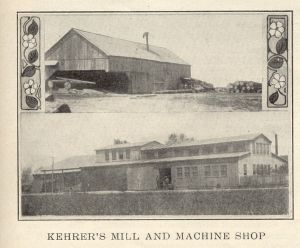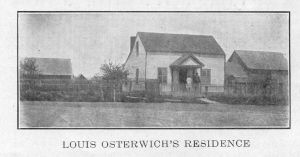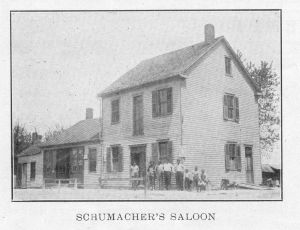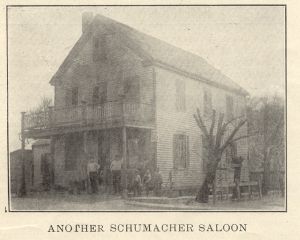|
Page 71 |
|
|
New Memphis is one of the old inland towns of Clinton county and is located one and one-half miles north of New Memphis station on the Louisville and Nashville railroad and about ten miles east of Mascoutah. It is four miles south and east of New Baden and is a thriving little incorporated village. It has one large saw mill and machine shop, one large general store, two saloons, one blacksmith shop, one doctor, one carpenter, a church and school with an enrollment of over 60 pupils. The surrounding country is rich in agriculture and the farmers and business men are prosperous. New Memphis is beautifully situated on a slight elevation in the prairie, in the northwest quarter of section 5, town 1 south, 5 west. As early as 1862 the Lutheran denomination built a neat brick church here. The town was laid out in 1865, on March 29, by John SCHUCHMANN. A large brick flouring mill was built the same year by John SCHUCHMANN & Co., which was operated until it burned down in February, 1879. In 1865 John KELLENBERG built a house and opened a small store. In 1866, LUNT, PETERS and Co., built a large brick business house and opened a general store. F. PETERS was the first post master. Among the business men are: Peter A. KEHRER Mr. KEHRER is a practical thresherman and a manufacturer of hardwood lumber. He also operates a machine shop and does all kinds of repairing. In connection with the above he is a dealer in new and second-hand engines and threshers. The firm of which the above is head has added automobiles to its list of stock and is
doing a nice business in that line also. The saw mill has been in operation for the past 20 years and custom and commercial sawing is done, the wood being shipped all over |
the country. The capacity of the mill is 4,000 feet daily. It is the largest building in the little city, and from the accompanying reproduction, herewith published, a fair idea of the size of the saw mill and machine shop can be readily gained. It is located in the northeastern part of the town. Mr. KEHRER was born in St Clair county in 1859 and moved to New Memphis in 1885. He was married in 1882 to Albertina SCHUPP and raised seven children, all of whom are living. They are four boys and three girls. The four sons are connected with the father in business and two of the daughters are married. One is at home. Two of the sons are married. They are John and Benjamin. Joseph and August live at home. Louis OSTERWICH Mr. OSTERWICH was born in Germany and is a son of Christian and Charlotta OSTERWICH. He came to St. Clair county in 1870 and after remaining a year sent
home for the old folks to join him. They were greatly astonished at the great country of America and decided to remain. When they arrived in St. Clair county they located at Mascoutah and remained there one year. In 1871 they moved to Clinton county and have been residents of New Memphis ever since. Louis has been one of the highway commissioners for fifteen years and was a school director in New Memphis for nine years. He is also police magistrate and has held that important office for 12 years. He is a farmer and stockraiser and trader by occupation, and raises some of the finest stock in the county. His farm consists of 100 acres and adjoins the little city. He raises everything that can be raised in this section of the country on his land, and a part of it is devoted to pasture where he feeds his cattle and other stock. He has twelve head of cattle, all fine thoroughbred stock and from six to eight head of horses and mules the year around. He also raises chickens which he ships to St. Louis and other markets. He was married in 1886 to Elizabeth SAEGER of New Memphis and is the father of eight children, all living. There are five boys and three girls in the family and three boys and two girls live at home with the parents, the others being married. The oldest is 33 years of age and the youngest 13. Mr. OSTERWICH is one of the best known men in his section of the county and has a host of friends. |
|
Page 72 |
|
|
The Park Saloon New Memphis has two saloons and they are owned and operated by two brothers, Henry E. and George SCHUMACHER, enterprising young business men. Seven years ago Henry started into the saloon business in this manner. George started into the business in 1906 with
Jess EISENHAUER and sold out a short time later to join his brother who had started another saloon on the next corner. After the transaction George and Henry bought out EISENHAUER and began to operate both saloons, which they have continued to do ever since. They handle Western beer on draught and all kinds of bottled beers, wines, whiskey and cigars. They were born in New Baden and are the children of C. L. A. and Louise SCHUMACHER, pioneers of the county. A brother, L. A., manages and owns one of the largest general stores in New Baden. Both young men are married and have children. They are highly esteemed by the townspeople and farmers who make New Memphis their trading place, and as they run only first class saloons they have an excellent patronage. George
does a livery business in connection with the saloon and makes drives all over the southern and eastern part of the county. Both young men have excellent wives and fine homes. They re increasing the sales in the business wonderfully each year. In April, in 1910 the land in farms in the United States, according to the census returns, amounted to 878,798,325 acres of which 478,457,750 acres were improved. |
MEMORIAL MEETING. At the memorial meeting held in New Haven, former President Taft paid the following tribute to the late Major Archibald W. Butt, one of the heroes of the Titanic disaster: "He was incapable of intrigue. He had a clear sense of humor, and it lightened his life and the lives of those about him. He was single-minded and loyal, and never had any doubt about what he ought to say. Life was not for him a troubled problem. He was a soldier. I very much doubt whether I have ever known a man who had as much self-abnegation, as much self-sacrifice, as much abilty to put himself in the place of another and suffer and enjoy with thaa other as Archie Butt had. Occasions for tests like that of the going down of the Titanic frequently develop unforeseen and unexpected traits in men and make them heroes, but with Archie, what he did was nothing but conformity to a rule of his life. He was on the deck of the Titanic exactly what he was everywhere else, and if he could have selected a time to die he would have taken the one that God gave him. He would have taken it because he would have felt that there before the world he was exemplifying the ideal of self-sacrifice. He left with us the sweet flavor of his unselfish life, and while we mourn for him we felicitate him on the way he went. His heroism will stand as an example for future generations." AMERICA'S MISSION. Much has been said of late about Anglo-Saxon civilization. Far be it from me to detract from the service rendered to the world by the sturdy race whose language we speak. The union of the Angle and the Saxon formed a new and valuable type, but the process of race evolution was not completed when the Angle and the Saxon met. A still later type has appeared which-As superior to any which has existed heretofore; and with this new type will come a higher civilization than any which has preceded it. Great has been the Greek, the Latin, the Slav, the Celt, the Teuton and the Anglo-Saxon, but greater than any of these is the American, in whom are blended the virtues of them all. Civil and religious liberty, universal education and the right to participate, directly or through representatives chosen by himself, in all the affairs of government-these give to the American citizen an opportunity and an inspiration which can be found nowhere else. Standing upon ,he vantage ground already gained, the American people can aspire to a grander destiny than has opened before any other race. Anglo-Saxon civilization has taught the individual to protect his own rights! American civilization will teach him to respect the rights of others. Anglo-Saxon civilization has taught the individual to take care of himself; American civilization, proclaiming the equality of all before the law, will teach him that his own highest good requires the observance of the commandment: "Thou shalt love thy neighbor as thyself." Anglo-Saxon civilization has, by force of arms, applied the art of government to other races for the benefit of Anglo-Saxons; American civilization will, by the influence of example, excite in other races a desire for self-government and a determination to secure it. To American civilization, all hail! "Time's noblest offspring spring is the last! "-Extract from speech delivered by Mr. Bryan at Washington Day banquet, given by the Virginia Democratic Association, at Washington, D. C., February 22, 1899. Government revenues from customs receipts fell off more than $6,000,000 in May, compared with the same month of last year. The production of oats increased from 943,000,000 bushels is in 1899 to 1,007,000,000 bushels in 1909. |
This file last modified



